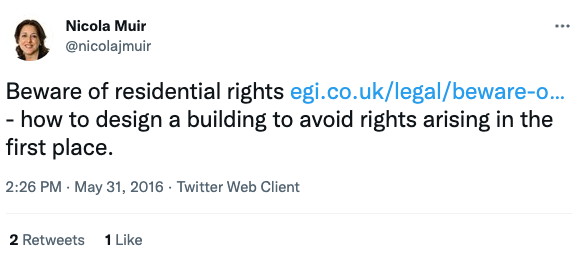
Government launches a final consultation to gauge views on mixed-use sites and commonhold
Campaign to end the 25% commercial property bar that blocks leaseholders from wresting control from aggressive landlords
Please respond here:
Reforming the leasehold and commonhold systems in England and Wales
This consultation seeks views on reforms to the leasehold and commonhold system following recommendations in the Law Commission’s reports published in July 2020.
The government has launched a final stage consultation with a February 22 deadline to address the issue of leaseholder empowerment / commonhold at complex mixed-use sites.
It is essential that affected leaseholders respond, especially those living in prime city sites.
The consultation also addresses commonhold in shared ownership properties and the provision of information on sale of commonhold homes.
The consultation comes with a robust message from Lord Greenhalgh, the housing minister tasked with leasehold reform, who writes:
“The sad truth is that, for too many leaseholders, the dream of home ownership has become a nightmare of crippling ground rents, extra fees, and onerous conditions often imposed with little or no consultation.
“This is not home ownership in the truest sense of the word …
“We are determined to right this wrong; to reform the entire leasehold system and make it fairer as we help more people to own their own home and level up opportunity across the whole United Kingdom – our new department’s and this government’s central mission.”
LKP has long campaigned to replace the 25% commercial block on leaseholders having any say in the management of buildings with a fairer 50% rule: overwhelmingly, residential leaseholders have the greatest financial stake in these buildings and should get to control their service charges.
We also want to pay tribute to the work of leasehold campaigner Harry Scoffin, who pressed the Law Commission to accept this point in its reports that are the basis for the government’s reforms.
Leaseholders should be in no doubt that freeholders will push back hard on this point, which is why it is essential to participate in the consultation.
The revenue streams from management of prime London sites are considerable: one can see how aggressively they have been defended in the legal war of attrition at Canary Riverside, in Docklands (c.30% commercial).
And here is the same landlord, Monaco-based John Christodoulou, spending £74,560 on a legal team to block a recognised tenants association at nearby West India Quay (47% commercial):
(At risk of being accused of lawyer bashing, this action was preceded by a legal scamp phoning the then chair on the evening before the hearing asking whether she had received his earlier letter threatening defamation – about which nothing further was heard. Bullying is seldom more blatant.)
The announcement of the consultation was met with an immediate mail-out by leasehold lawyers in the Association of Leasehold Enfranchisement Practitioners, so assume they will be putting in some time for their freehold owning clients.
In the past, LKP has noted wryly the advice of legal firms that developers build with just over 25% commercial property: to avoid the risk of leaseholders exercising the right of first refusal to purchase the freehold and, therefore, to ramp up the value of the freehold.

Last autumn, Lord Young (former housing minister Sir George Young), explained how the freeholder representatives in the House of Lords lobbied for the 25% rule. Debating the current Leasehold Reform (Ground Rent) Bill, he explained:
“When I put the Leasehold Reform, Housing and Urban Development Act [1993] on the statute book, one of the most contentious issues was the exemption from enfranchisement of mixed-use buildings, with shops on the ground floor and flats above.
“After a dialogue between the two Houses, when your Lordships’ House still had a healthy representation of the country’s freeholders and the other place was concerned more with leaseholders who actually had votes, we ended up exempting properties where the commercial use was 25% or more of the total space.”
So the reform was nobbled.
The leaseholders at Charter Quay – headed by Martin Boyd, chair of LKP – found use of s.25(4) of the 1987 Landlord and Tenant Act, which allows leaseholders of a site that has had a section 24 court-appointed manager in place for two or more years compulsorily to acquire the freehold.
In spite of the fact that Charter Quay has five blocks that range from no commercial at all to 60% it was eligible.
Furthermore, and unusually, the income streams of the commercial units do not belong to the head lease, which meant that the leaseholders could buy it for £900,000. Had the commercial income been part of the head lease the price would have been eight to ten times more.
Nonetheless, the leaseholders’ action was an appalling surprise to Vincent Tchenguiz, whose British Virgin Island based Tchenguiz Family Trust ultimately owned this asset.
The leaseholders duly celebrated in July 2013 his departure as headlease and freehold owner with choirs, bands, speeches by then Cabinet minister Sir Ed Davey (an LKP patron) and a methuselah of Pol Roger champagne.
Unfortunately, there are limited set of circumstances where the 1987 Act applies and if the revenues of the commercial space belongs to the freehold or headlease the cost of buying them will often be prohibitive.
For all that, the victory at Charter Quay did establish that leaseholders could compulsorily purchase a site with considerably more than 25% commercial, and run it effectively as well.
Without recognising that it was parroting the property interests of the 1990s House of Lords, the Law Commission proposed to keep the 25% commercial rule for collective enfranchisement and commonhold conversion.
It was thanks to noisy opposition from Harry Scoffin, who frequently contributes to LKP, and leaseholders at West India Quay and Canary Riverside, that this was bumped up to 50%.
The consultation on mixed-use sites comes as the Leasehold Reform (Ground Rents) Bill goes through Parliament, ending new ground rents on new builds.
The government is also pledged to reform the process of enfranchisement valuation by abolishing marriage value, capping ground rents in the valuation calculation at 0.1% of the freehold value and prescribing rates for calculations at market value.
“Together these changes will save some leaseholders thousands if not tens of thousands of pounds,” says Lord Greenhalgh.
A secondary part of the consultation involves commonhold, and asks for views that were omitted by the Law Commission.
First, shared ownership is not available in commonhold structures, but the Law Commission recommended that it should be.
The government is wanting to make providers – typically housing associations – responsible for all repairs in an “initial repair period” of 10 years.
The consultation seeks views on this.
Second, a Commonhold Unit Information Certificate, the “CUIC”, is used in the buying and selling of commonhold title – essentially, the commonhold association needs to provide this to the seller who then passes it to the buyer as part of the conveyancing process.
There may be a fee involved here and the consultation seeks views on this and the amount that reasonably could be asked.
The issues on commonhold are tidying up measures, while the 25% commercial rule is a reform that would be of benefit to thousands of leaseholders.
Please fill in this consultation!





 In Gove we trust, but developers can pay cash
In Gove we trust, but developers can pay cash






















Leasehold property is a way for landlords to make money from people who want to manage their own homes Leaseholders pay a lot for property, they do not really own and they continue to pay exorbitant fees for Service Charges as well as ground rent. No wonder they are so many homeless. It is in the interest of the government to change leaseholders and allow owners to have the freehold, this will encourage more people to buy their own homes and it will end homelessness.
Sadly I do not see any reforms to combat the way how freeholders rip off leaseholders through service charges and major works ((. Social Housing landlords as bad as the private. leaseholders ars trapped unable to splash money on solicitors, tribunals, courts to combat the problems. how the reform will help those leasholdes – not clear.